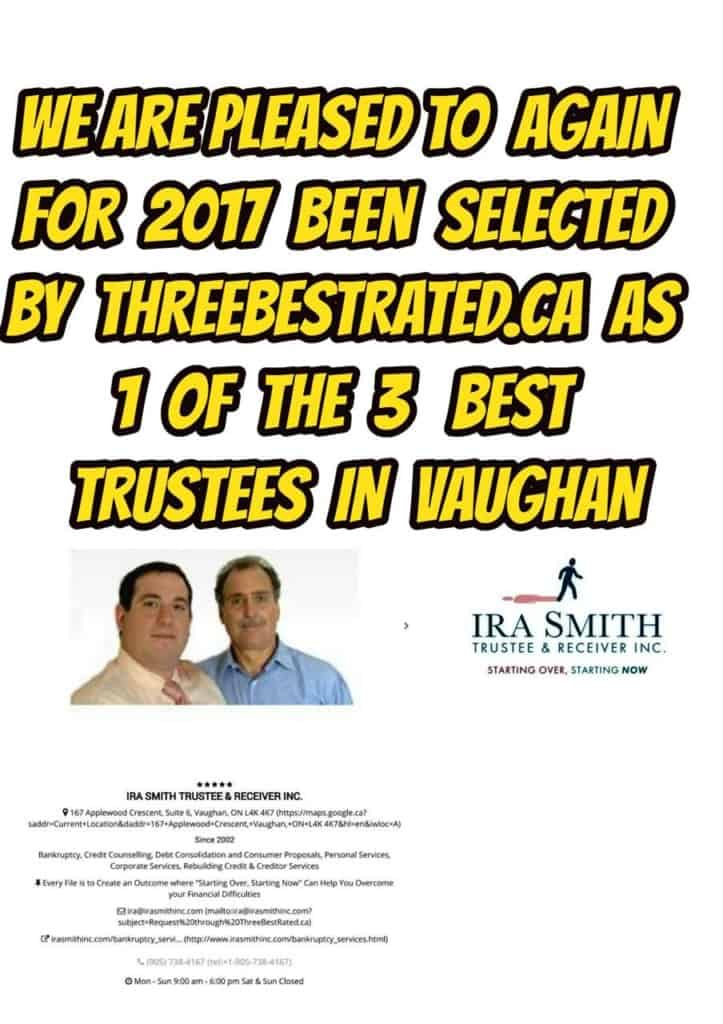
- Ontario bankruptcy discharge certificate: Introduction
- The facts
- The Ontario Court of Appeal (“ONCA”) upheld the two lower Court decisions
- Now for the interesting stuff!
- What the Master decided
- The dismissed appeals
- So what is the lesson to be learned?
- he person needs our advice in plain English before making any decisions
- What to do if you have too much debt
Ontario bankruptcy discharge certificate: Introduction
I have written before on the more practical aspects of Ontario bankruptcy discharge certificate issues and process within Canadian bankruptcy and insolvency law. The most recent blogs are:
Thank you for reading our Brandon's Blog. Check out our AI insolvency bot on this page and don't forget to subscribe!
- BANKRUPTCY DISCHARGE: THE TOP 8 THINGS THE BANKRUPTCY COURT WILL CONSIDER ON ANYONE’S BANKRUPTCY DISCHARGE APPLICATION – September 13, 2017
- GAMBLING DEBT BANKRUPTCY: CAN GAMBLING DEBT BE DISCHARGED IN BANKRUPTCY? – January 31, 2018
I recently reviewed the Ontario Court of Appeal decision in Cole v. RBC Dominion Securities Inc., 2017 ONCA 1009. This case is very interesting as it highlights an issue that we often don’t talk enough about when advising a person on what they might expect at their hearing under Canadian bankruptcy and insolvency law.
The facts
Henry Cole, age 52, had a Bankruptcy Order made against him in 2011 upon motion by Royal Bank of Canada (“RBC”), after he misappropriated $5 million from clients while working as their investment advisor. While in bankruptcy, he had a net monthly income of $14,600, resulting in surplus monthly income of $12,500. He nevertheless failed to make any surplus income payments.
To understand what surplus income in a bankruptcy is, see my June 1, 2016 vlog titled WHY SURPLUS INCOME IS SO POPULAR UNTIL YOU ARE FORCED INTO BANKRUPTCY.
The Ontario Court of Appeal (“ONCA”) upheld the two lower Court decisions
As is the case in bankruptcy matters, Mr. Cole’s bankruptcy discharge hearing came before the Master in Bankruptcy Court who also sits as the registrar in bankruptcy. Mr. Cole appealed the Master’s decision (discussed below) unsuccessfully to a Judge of the Bankruptcy Court. The Judge dismissed Mr. Cole’s appeal, thereby upholding the Master’s decision. As indicated above, the ONCA agreed with the Judge (and the Master) in dismissing Mr. Cole’s appeal.
Now for the interesting stuff!
Now for the interesting stuff. The Master determined that there was enough evidence to show that Mr. Cole, as a bankrupt, committed various bankruptcy offenses. The Master determined facts for which discharge may be refused, suspended or granted conditionally, under Section 173(1) of the Canadian bankruptcy and insolvency law called the Bankruptcy and Insolvency Act (Canada) (“BIA”).
The Master determined that Mr. Cole had failed to provide information to enable the Licensed Insolvency Trustee to calculate surplus income. Mr. Cole also conceded to the following facts:
- his assets upon bankruptcy were not of a value equal to fifty cents on the dollar on the amount of his unsecured liabilities. Mr. Cole gave no evidence why he should not be held responsible;
- he failed to account satisfactorily for any loss of assets or for any deficiency of assets to meet his liabilities; and
- he brought on, or contributed to, his bankruptcy by rash and hazardous speculations, by unjustifiable extravagance in living, by gambling or by culpable neglect of his business affairs
With these findings, the Master, under Section 172(2) of the BIA, had to not grant an absolute discharge and to:
- refuse the discharge of a bankrupt;
- suspend the discharge for such period as the court thinks proper; or
- make the bankrupt, as a condition of his discharge, to do such acts, pay such moneys, consent to such judgments or comply with such other terms as the court may direct.
I must point out that the options available to the Master are not mutually exclusive. So, just like in Mr. Cole’s case, you could have the Court come up with a mixture of a suspension and a condition to pay moneys.
What the Master decided
The Master made several decisions. First, the Master dealt with the surplus income issue. The Master ordered Mr. Cole to pay $284,346 to the Trustee as surplus income, payable at a rate of $5,000 per month.
The Master also considered Mr. Cole’s criminal behaviour and that he had real income while not working any longer as an investment advisor. Given the amount of Mr. Cole’s liabilities, and for the integrity of the Canadian bankruptcy system, the Master ordered as further conditions that:
- Mr. Cole pay an extra $5,000 per month to the Trustee for a further six years for a total more payment of $360,000; and that
- his discharge from bankruptcy be suspended for two years.
The dismissed appeals
Mr. Cole argued before first the Judge, and then the ONCA, primarily that the Master’s treatment of surplus and other income was in error. He also argued that the Judge’s finding in dismissing his appeal was an error. The ONCA disagreed and dismissed his appeal.
So what is the lesson to be learned?
It is important for the Trustee, when sitting down with the person contemplating an insolvency proceeding, to understand all the facts. By properly understanding all the facts, we can provide proper professional advice and guidance.
Someone who had a facts situation like Mr. Cole, we would have strongly advised him or her to avoid bankruptcy and to contemplate performing a Division I Proposal to compromise his debts. The reasons we would have advised this are:
- the debtor has real income to successfully do a Proposal;
- Mr. Cole never would have qualified for an absolute discharge from bankruptcy given his facts situation and any discharge conditions would be onerous;
- avoiding the ongoing calculation of surplus income up to the time of his bankruptcy discharge hearing; and
- with the support of his major creditors, it is possible that the Proposal amount could have been somewhat less than $644,000 (subject to knowing the value of his assets at the date of bankruptcy).
he person needs our advice in plain English before making any decisions
We also would have advised the debtor the type of the rough ride they were in for if they chose to go ahead with the bankruptcy option. We would have explained in detail how we believed the Canadian bankruptcy and insolvency law system would treat him, so at least there would be no surprises during the bankruptcy administration.
Many times people we speak with do not like to hear the truth, and begin “Trustee shopping” until they find a Trustee that does not tell them all the bad news up front. People like this believe that if they aren’t told it, it can’t happen. This is a mistake. We believe everyone deserves to know the truth about their situation, to help them make the best decision possible.
In Mr. Cole’s case, not only did he find out the hard truth from the Court, he then spent money on his lawyers appealing the Master’s and Judge’s decisions. That obviously was extra money spent with no benefit received.
FULL DISCLOSURE: Our firm has never met with Mr. Cole and was not considered to be his Trustee.
What to do if you have too much debt
Declaring personal bаnkruрtсу in Canada is a big deal. So is getting your Ontario bankruptcy discharge certificate. While it can be a way out for the honest but unfortunate debtor who is deep in debt and looking for a new start, there are rules, rеѕtrісtіоnѕ and fіnаnсіаl rаmіfісаtіоnѕ.
That is why the Ira Smith Team always looks first to see if one of the bankruptcy alternatives would be a better fit for you. The alternatives we look at with you include:
The Ira Smith Team has 50+ years of cumulative experience dealing with issues just like the ones that you’re facing. Give us a call today and let us give you back peace of mind Starting Over, Starting Now.


